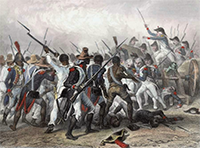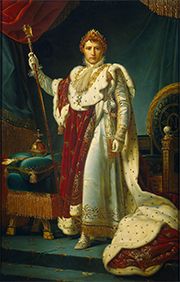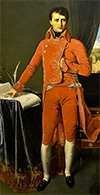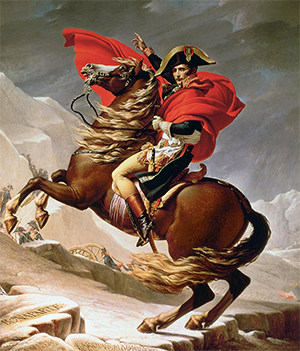Napoleon Bonaparte: Giant of the Age
Part 4: First Consul to Emperor
The First Consul promulgates the laws; he appoints and dismisses at will the members of the Council of State, the ministers, the ambassadors and other foreign agents of high rank, the officers of the army and navy, the members of the local administrations, and the commissioners of the government before the tribunals. He appoints all criminal and civil judges other than the justices of the peace and the judges of cassation, without power to remove them. The Consulate came into being after a nationwide vote, on Feb. 7, 1800. The response was overwhelmingly in favor of the new Constitution. In practice, the Consuls, as the executive branch, ran the government. The First Consul was the one "who promulgates the laws." The Tribunate could debate proposed laws but could not vote on them. The particulars of those debates accompanied a proposed law to the Legislative Body, which could pass or vote down laws but could not discuss or change them. The Senate reviewed draft bills in order to inform the First Consul fully on the potential results of such laws. It was up the First Consul, then, to declare proposed laws in effect or dead letters.

The two armies met on June 14 in the Battle of Marengo. Austrian forces numbered 30,000 men and 100 guns; French forces numbered 22,000 men and 15 guns. A surprise Austrian attack set the tone for the day. Bonaparte, thinking that the Austrians were instead retreating from the area, had dispatched elements of his force in other directions, anticipating entrapment. Consequently, as the battle unfolded, he was late in issuing orders. One of those was to recall Gen. Louis Desaix, whom he had sent some miles to the south, along with 6,000 men. The two sides traded fire throughout the day, and the Austrians got the better of things more than once, consistently pushing the French troops into retreat. Melas, slightly wounded and thinking the battle won, delegated command after issuing what he thought was the final order of victory. Instead, Desaix returned with his 6,000 men and initiated a counterattack, incorporating a heavy cavalry charge. It was enough to send the Austrians reeling and give the French the victory. In the north, General of Division Jean Victor Marie Moreau scored a number of key victories over Austrian forces, including a knockout blow at Hohenlinden in December 1800. France and Austria agreed to the Treaty of Lunéville, which ended Austrian participation in the war. The fighting against Great Britain continued, with British troops seizing control of Egypt in September 1801. Those two powers agreed to the Treaty of Amiens, which ended the war in March 1802. Just two months later, in May 1802, Bonaparte won nationwide affirmation of his governmental position via a referendum on a proposal to make him First Consul for life. The response was an enthusiastic "Yes" from a vast majority of voters, who also implored him to guarantee continuity by designating his successor. The referendum actually made the Consulate permanent, but Bonaparte's status as the effective dictator was the most obvious beneficiary. 
With peace in Europe for a time, Napoleon turned his focus to France's overseas colonies, in particular two in North America: Haiti and Louisiana. The former had won its independence a decade earlier; and its revolutionary leader, Toussaint L'ouverture, was still in charge of what was known as Saint-Domingue. Napoleon sent an armed force under general Charles Leclerc to take back control of the Caribbean nation. That expedition captured L'ouverture but couldn't defeat the Haitians. A combination of determined resistance of the Haitians to a return to overlordship (led by Jean-Jacques Dessalines) and a lack of resistance of French troops to yellow fever resulted in a stark defeat for the European power. Not even a 20,000-strong relief force sent by Rochambeau could turn the tide. French troops left the island in 1803, and the independent republic of Haiti was born the following year. In the same year that France abandoned Haiti, Napoleon gave up his North American territory. He got a lot of money for the Louisiana Purchase, all of which he spent on a planned invasion of the U.K., with which France was again at war. The War of the Third Coalition began in early 1803 in part because of a dispute over Malta. The Treaty of Amiens contained language that required British personnel to leave the island, which they had taken from France. Claiming a sort of quid pro quo with French troops who hadn't yet left ports in Italy, the U.K. forces in Malta refused to leave. The London Government was concerned with other goings-on in 1802 as well, particularly other actions that France had taken, such as assuming ownership of Piedmont and dictating a change in government for the Swiss Confederation–both of which were technically in breach of the Treaty of Lunéville, which had ended the war with all but the U.K. in 1801. Napoleon had enormous power and support at this time but did face one serious plot in the form of an assassination attempt that would have replaced him 
Joseph Fouché, the once and future Minister of Police, advised Bonaparte, after this latest of several attempts on his life, that the country might do well with a more secure form of succession, guaranteed by a hereditary title. Bonaparte reluctantly agreed, as long as the rest of the government went along. On May 18, 1804, the Senate passed a bill proclaiming that France was an Empire and that Napoleon was its Emperor. Thus ended the Consulate. To maintain the support of the army, Napoleon elevated 18 of his most trusted commanders to the ancient rank of Marshal. Napoleon's coronation took place on December 2, at Notre Dame de Paris. Pope Pius VII officiated. To the ceremony Napoleon wore a gold laurel wreath reminiscent of the headgear worn by the leaders of Ancient Rome. During the ceremony, the newly proclaimed Emperor of the French crowned his wife, Joséphine, as Empress with a replica of the crown of Charlemagne. Next page > Frustration in the English Channel > Page 1, 2, 3, 4, 5, 6, 7, 8, 9, 10, 11, 12 |
|
Social Studies for Kids
copyright 2002–2026
David White



 The Constitution named Napoleon as First Consul and delineated his powers and responsibilities:
The Constitution named Napoleon as First Consul and delineated his powers and responsibilities:
 Meanwhile, France was still at war Bonaparte went himself to Italy, to take command of French forces there. The Austrians under Michael von Melas had besieged Genoa. In mid-May, the French army crossed the Alps via the Great St. Bernard Pass, still covered in snow. After subduing an advance Austrian cadre in the Aosta Valley, the French force seized Milan, Pavia, and other locations, in order to severe the lines of communication of the Austrian forces there. Because Bonaparte's force had not gone to Genoa to raise the siege, the French commander, Masséna, had no choice but to surrender, which he did, on June 4. The Austrians, meanwhile, were concentrating their forces in Alessandria.
Meanwhile, France was still at war Bonaparte went himself to Italy, to take command of French forces there. The Austrians under Michael von Melas had besieged Genoa. In mid-May, the French army crossed the Alps via the Great St. Bernard Pass, still covered in snow. After subduing an advance Austrian cadre in the Aosta Valley, the French force seized Milan, Pavia, and other locations, in order to severe the lines of communication of the Austrian forces there. Because Bonaparte's force had not gone to Genoa to raise the siege, the French commander, Masséna, had no choice but to surrender, which he did, on June 4. The Austrians, meanwhile, were concentrating their forces in Alessandria. with the future Louis XVIII. Engineering the plot was Georges Cadoudal (left), a longtime opponent of the Revolutionary government. In on the conspiracy were two French generals, the War of the Second Coalition hero Jean Victor Marie Moreau and the War of the First Coalition hero Charles Pichegru. Financing the plot was the U.K. government, in the person of Prime Minister
with the future Louis XVIII. Engineering the plot was Georges Cadoudal (left), a longtime opponent of the Revolutionary government. In on the conspiracy were two French generals, the War of the Second Coalition hero Jean Victor Marie Moreau and the War of the First Coalition hero Charles Pichegru. Financing the plot was the U.K. government, in the person of Prime Minister 
